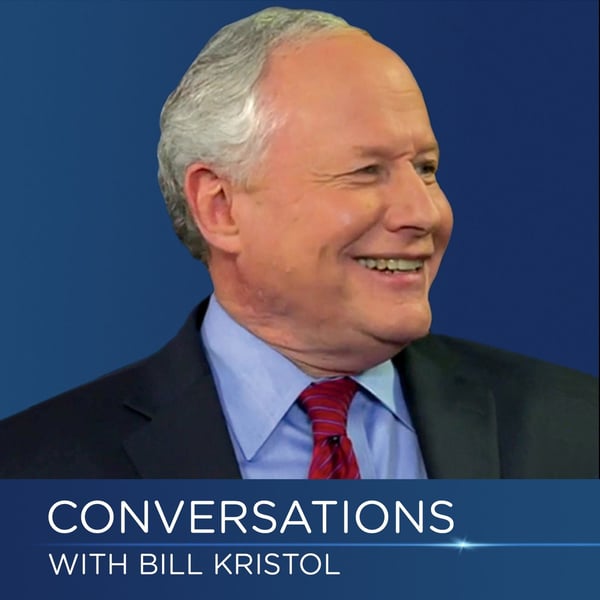Anne Applebaum: Putin’s War on Ukraine and its Consequences
Conversations with Bill Kristol
Conversations with Bill Kristol
4.7 • 1.7K Ratings
🗓️ 25 February 2022
⏱️ 44 minutes
🧾️ Download transcript
Summary
Transcript
Click on a timestamp to play from that location
| 0:00.0 | Hi, I'm Bill Crystal. Welcome to Conversations. I'm very pleased to be joined today, though it's a worrisome and sad day in many ways. |
| 0:23.0 | By my friend Ann Applebaum, I think the leading commentator on analyst of Russia, Ukraine, and here we are on what is the Thursday morning of February 24th with 12 hours after the full scale Russian invasion of Ukraine. You can Google and and read her excellent articles recently in the Atlantic. She's been consistently correct actually in analyzing. I think what Russia might do what Putin might do to one of what a logical last night actually about. |
| 0:51.0 | Ukraine and excellent book on democracy and authoritarianism recently, previous books on the gulag and on Russia's war in Ukraine. I saw one's war in Ukraine, I guess, many years ago, but seems of correct importance as well. So anyway, it's a great pleasure to be joined by Ann. And as I said, great to have you today, but not a not a happy day. |
| 1:14.0 | Thanks, Bill. No, it's not a good day. And I'm afraid I didn't sleep much last night. And so, you know, I'll do my best, but that will be better than others can do anyway. So your piece last night was terrific, which I recommend on Ukraine itself. And before we get to the deeper analysis, liberal world order and the US policy and so forth, let's say a word about Ukraine, a country you've visited many times with history, you've studied in depth. |
| 1:40.0 | I mean, they are there on the front lines. They need we should recognize them for a minute. I think before moving on to, you know, discussing Putin, which is important and all the other things we need to talk about. |
| 1:51.0 | So yes, I actually wrote that piece in response to Putin's very, very strange speech on Monday, in which he essentially said Ukraine doesn't exist. It's not a real country. And in fact, he came up with a theory about Ukraine that I'd never heard about before, which is that it was invented by Lenin. |
| 2:08.0 | Which, I mean, it's, you know, you don't want to even know what he was talking about, but it was a, it was very convoluted and weird. And I thought, you know, I, of course, have, as you say, I wrote a book about Ukraine. I've spent a lot of time there. I know a lot of Ukrainians. |
| 2:23.0 | And I, of course, assume things about them. Then I realized which people don't know. And so I wrote something that said, you know, who are they? Where do they come from? What's there? How was their identity composed? |
| 2:36.0 | I mean, in some ways, their story is no different from any other European country. I mean, they emerge at the medieval empire. |
| 2:44.0 | There was an medieval marble Kiev in Rus, which was Asia, and which was the ancestor of Russia, Ukraine and Belarus. They were then essentially a land colony of other empires for many years. |
| 2:58.0 | Much like the Irish were a land colony of the English, or the Slovaks, who were colony of the Hungarians. So there's a, it's, it's not an unknown, you know, way to have spent the 16, 17, 18 centuries. |
| 3:13.0 | And one of the things that that means is that Ukrainianness was always a kind of identity associated with anti-elidism, anti-establishment. |
| 3:23.0 | Sometimes, anti-the cities, it was an identity that was kind of preserved in the countryside at a time when there wasn't a Ukrainian state. |
| 3:32.0 | It, you know, it sort of has this kind of built into all the national heroes or partisans or rebels, or, you know, people who led up rising against the Tsar or against the Polish kings. |
| 3:43.0 | And so it has, it has almost got this kind of built into it, this kind of, you know, rebellious streak. |
| 3:51.0 | And also, of course, it has built into it a historical memory of kind of grassroots and civic organization. |
| 3:58.0 | This, again, actually, it has in common with other countries, a lot of other European countries before they had states. |
| 4:04.0 | They had national movements. And, of course, this is true of the Italians, this is true of the Germans. |
| 4:09.0 | You know, it's a, it, in truth, actually, most European countries, which is just a couple of exceptions, like England and France. |
| 4:16.0 | So there wasn't a state in the 19th century, and so they created kind of Ukrainian clubs and schools and Sunday schools and, you know, charitable organizations. |
| 4:24.0 | And that was how the, you know, that's how they expressed their identity. |
| 4:30.0 | They were very, so unlike other, you know, nationalities, they were very brutally repressed by the Russians ours, by the Imperial Empire, which immediately saw them as a kind of threat. |
... |
Please login to see the full transcript.
Disclaimer: The podcast and artwork embedded on this page are from Conversations with Bill Kristol, and are the property of its owner and not affiliated with or endorsed by Tapesearch.
Generated transcripts are the property of Conversations with Bill Kristol and are distributed freely under the Fair Use doctrine. Transcripts generated by Tapesearch are not guaranteed to be accurate.
Copyright © Tapesearch 2025.

